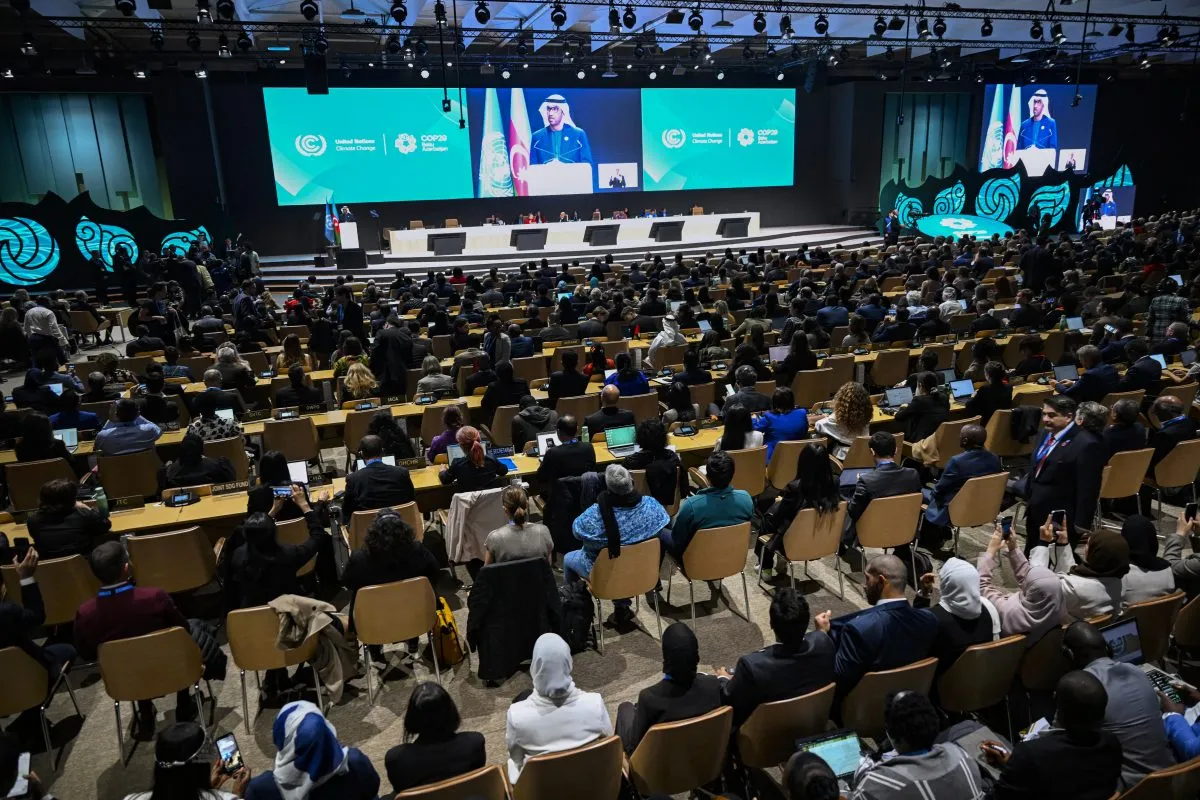Two weeks of negotiations at COP29 in Baku, Azerbaijan, finally concluded in the early hours of Sunday morning with an agreed text on climate finance – the funding needed to slow down climate change and adapt to its impacts. But as delegates departed from the Azerbaijani capital, it was hard to find voices that believed the compromise represents a good outcome for Africa.
“We leave Baku without an ambitious climate finance goal, without concrete plans to limit global temperature rise to 1.5°C, and without the comprehensive support desperately needed for adaptation and loss and damage,” said Evans Njewa, chair of the Least Developed Countries bloc at COP29. “This is not just a failure; it is a betrayal.”
Under the agreed text, governments set a goal for developed countries to support developing countries with at least $300bn a year in climate finance by 2035. Nominally, this represents a tripling of climate finance commitments. The problem? The $300bn figure is widely acknowledged to be only a fraction of what is needed to assist countries that did the least to cause climate change, but are now bearing the brunt of its effects.
The so-called “new collective quantified goal on climate finance”, or NCQG, was supposed to be based on need. Governments went through a lengthy process of calculating their financial needs for mitigation and adaptation. Based on this, developing nation governments demanded that the NCQG should add-up to $1.3 trillion per year.
Yet the idea that global policymakers would follow a robust procedure to arrive at a needs-based goal ran into the reality of tight purse strings in developed nation capitals, who offered a target of just $250bn. When this prompted a walk-out by the Alliance of Small Island States group of countries, the offer was raised to $300bn, with a vague mention of “scaling up” financing to $1.3 trillion pasted into the text.
“A genuine disaster”
The outcome of the NCQG talks prompted a wave of anger among NGOs in Africa.
The $300bn deal is “unserious and dangerous”, David Abudho, climate justice lead for Oxfam in Africa, told African Business. Poor countries were “bullied” into accepting the outcome, he adds, describing the text as “a soulless triumph for the rich, but a genuine disaster for our planet and communities who are being flooded, starved, and displaced today by climate breakdown.”
“And as for promises of future funding? They’re just as hollow as the deal itself.”
It is certainly true that there is little clarity on how the goals set in Baku will be met. The final outcome was an agreed text, rather than a legal instrument that commits specified actors into taking specific action.
The path to actually reaching $300bn is unclear, let alone $1.3 trillion. For one thing, there is no breakdown over how climate finance commitments are to be divided among developed countries. In fact, it is not even clear which countries should be classed as “developed” and therefore responsible for providing climate finance. Western governments are arguing that China, the world’s largest polluter, must help foot the bill, for example. And while the text states that finance is to come “from a wide variety of sources”, including the private sector, it neglects to mention how or by whom this private finance is to be mobilised.
Oxfam estimates that developing nations’ true climate finance requirements are $1.5 trillion per year by 2030. It argues that funding must come largely in the form of grants, especially for adaptation, to avoid plunging developing countries into greater indebtedness. While the COP29 text acknowledges the need for grant funding in some contexts, it fails to exclude the possibility that interest-bearing loans will end up being counted as climate finance.
COP-out?
Even before the talks in Baku began, questions had been growing about the continued relevance of the annual COP gathering. The mood was further dampened just before the conference by the re-election of Donald Trump, who in his first term led the US out of the landmark Paris Agreement to limit global temperature rises.
During the summit a group of climate leaders made a high-profile intervention calling for reform to the COP process, including the creation of a mechanism for tracking climate finance disbursements. Demands for a shift in how global governments tackle climate change are sure to grow louder as a result of the disappointment on the NCQG.
South African businessman Ivor Ichikowitz describes the COP29 deal as a “complete con”. He told African Business that the countries with the highest emissions are in control of the negotiating process, meaning that climate finance “can’t and doesn’t flow because of a massive conflict of interest”.
Complaining at having to listen to the “same nonsense” in Baku as at other COPs, Ichikowitz argues that African and other developing nation governments must seize control of the process. “The only way that this is going to be resolved is if the absorbing countries start becoming vocal and start actually becoming the driver of the process, instead of being compliant, instead of allowing themselves to be bullied into bad deals.”
Mobilising private finance
The debate on the future of the climate agenda will intensify. But, in the meantime, much of the work on delivering climate finance will fall to development finance institutions.
Marco Serena, chief sustainable impact officer at the Private Infrastructure Development Group (PIDG), a donor-funded infrastructure finance institution, acknowledges that Africa “cannot see COP as a full success”.
He believes, however, that the deal provides “something to build on”. The $300bn goal, while not enough to meet the needs of developing countries, “is a start,” he adds, noting that plans must be put in place to deploy funds quickly.
Serena says that PIDG – which has made climate action one of its core focus areas – looks to mobilise private finance for infrastructure by de-risking the project pipeline. This means, in practice, investing in blended capital structures and funding projects that are at the earliest, highest-risk stage of development.
Amid financial constraints in Western countries, the outcome of COP29 suggests it is unrealistic to expect a flood of public finance flowing into climate action in Africa.
Holger Rothenbusch, managing director and head of infrastructure and climate at British International Investment, the UK’s development finance institution (DFI), agrees that mobilising private capital must be front of the mind of institutions seeking to support Africa in deploying renewable energy.
“What we are increasingly focused on is how we can use our balance sheet and capital more effectively to mobilise commercial capital on the back of our investments,” he says. Noting that DFIs traditionally pursue a “patient capital” model, he says that BII aims to be “smarter around recycling capital more quickly, so we use the same dollar a few times”.
Rothenbusch suggests that public finance must step-in, however, when it comes to adaptation.
Adaptation, he says, “is where scarcity will bite, because that needs to be grants, that needs to be really highly subsidised funding, which is the most constrained pool of capital.”
“That doesn’t really lend itself much to commercial funding, because many of the needs will be around public goods, like if you’re building sea walls, for example,” Rothenbusch adds. “This does require donor funding and the public sector supporting at a great scale.”
Want to continue reading? Subscribe today.
You've read all your free articles for this month! Subscribe now to enjoy full access to our content.
Digital Monthly
£8.00 / month
Receive full unlimited access to our articles, opinions, podcasts and more.
Digital Yearly
£70.00 / year
Our best value offer - save £26 and gain access to all of our digital content for an entire year!

 Sign in with Google
Sign in with Google 



